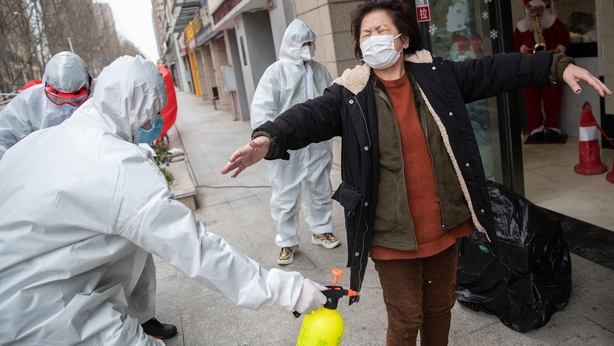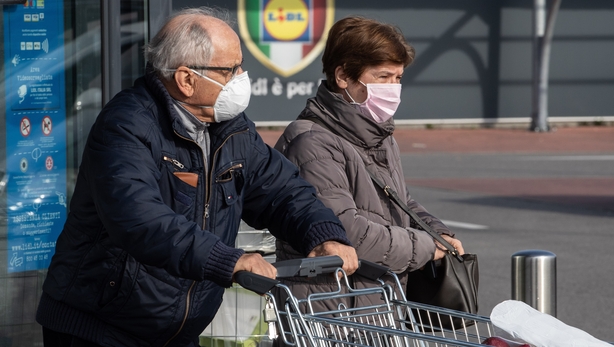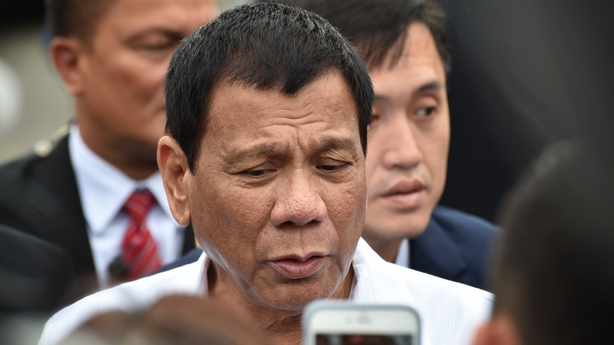The number of confirmed coronavirus cases in the UK has increased by 134 since yesterday, its biggest day-on-day increase since the outbreak began.
There are now 590 confirmed cases of Covid-19 across Britain.
Earlier, United Nations Secretary General Antonio Guterres urged world governments to urgently scale up their response to the pandemic.
His appeal echoed the one by the World Health Organisation yesterday, which blamed the spread and severity of the pandemic on what it described as "alarming levels of inaction".
"We can still change the course of this pandemic but that means addressing inaction," he said. "I call on every government to step up and scale up their efforts - now."
"The best science tells us, if countries detect, test, treat, isolate, trace and mobilise their people in the response, we can go a long way to mitigating transmission."
The number of fresh infections at the epicentre of China's coronavirus epidemic dropped to a new low on today but the country imported more cases from abroad.
Another 11 people died, the lowest daily increase since late January, bringing the toll in China to 3,169 deaths, according to China's National Health Commission.
There were only eight new cases in Wuhan, the city where the virus first emerged in December before growing into a national crisis and a pandemic.
It is the first time that new cases in Wuhan, the capital of Hubei province, have fallen to single-digits since figures started to be reported in January.
With cases falling dramatically in recent weeks, authorities this week began to loosen some restrictions on Hubei's 56 million people, who have been under quarantine since late January.

Healthy people living in low risk areas of the province can now travel within Hubei. While Wuhan is not included, some of the city's companies were told they could resume work.
Only one other non-imported case was recorded elsewhere in the country.
But as global hotspots emerge elsewhere, China fears that cases arriving from abroad could undermine its progress.
Today there were six more imported cases reported, bringing the total of infections from overseas to 85, health officials said.
We need your consent to load this rte-player contentWe use rte-player to manage extra content that can set cookies on your device and collect data about your activity. Please review their details and accept them to load the content.Manage Preferences
Beijing has ordered a 14-day quarantine for everyone arriving in the city from any country.
Read
US bans travel from Europe except Ireand & UK
Hanks and wife test positive for Covid-19
White House shamrock ceremony, New York parade cancelled
Latest coronavirus stories
Elsewhere, South Korea reported fewer than 120 new coronavirus cases, but authorities warned that a new cluster in Seoul could see the infection spread in the capital.
Around 100 people linked to a call centre in the city have tested positive for the virus in recent days.
"This could lead to a 'super spread' in the metropolitan area, where half of the entire population are concentrated," Prime Minister Chung Sye-kyun told a meeting.
So far, nearly 90% of South Korea's cases have been in the southern city of Daegu and the neighbouring North Gyeongsang province.
The South was the first country to report significant coronavirus numbers outside China, where the disease first emerged, and remains one of the world's worst-affected countries despite being overtaken by both Italy and Iran in declared cases.
A total of 114 infections were confirmed Wednesday, the Korea Centres for Disease Control and Prevention said, taking the South's total to 7,869.
Six more people died, it added, with the toll rising to 66.

Italy has shut all stores except for pharmacies and food shops in a desperate bid to halt the spread that has killed 827 in the country in just over two weeks.
Prime Minister Giuseppe Conte announced the latest wave of restrictions in a dramatic appeal to the nation that came with the country of 60 million battling its biggest crisis in generations.
"Thank you to all Italians who make sacrifices. We are proving to be a great nation," Mr Conte said in his nine-minute evening prime time address to the nation.
Italians have watched ever tighter restrictions slowly eat away at the very fabric of everyday life.
An existing clampdown on public gathering and basic travel had already emptied streets and shuttered everything from churches to restaurants.
Philippine President Rodrigo Duterte, meanwhile, will be tested for the virus, his spokesman said, as two key government buildings were being disinfected over an exposure scare.
The Philippines has seen a jump this week in cases, including people who recently attended events with Senate lawmakers and government officials, potentially exposing them.

Latin American countries have stepped up measures to slow the advance of the virus, announcing a slew of restrictions on travellers from the worst-affected countries and shutting down major sports events.
Argentina, Colombia and Peru announced that travelers from China, Italy, Spain and France would be isolated on arrival.
El Salvador went further; with President Nayib Bukele announcing late Wednesday the Central American country would ban entry to all foreigners for a period of 21 days.
The move would affect "any foreigner who is not a resident or diplomat" posted in the country, Mr Bukele said, adding that Salvadorans arriving from countries hit by the virus would face a 30-day quarantine.
El Salvador, which had previously banned entry on to those traveling from the worst-affected countries, is among a handful of states in the region yet to declare a confirmed case of the coronavirus.
Argentina was the first country in Latin America to register a coronavirus-related death on Saturday, with Panama announcing another on Tuesday.
The governing body of South American football (CONMEBOL) asked FIFA yesterday to delay its qualifying matches for the 2022 World Cup in Qatar.
"The South American teams risk not being able to count on players they have picked and who play in Europe because they, arriving from countries with a high level of contagion, could be placed in quarantine," CONMEBOL said in a letter expressing the position of its ten member countries.
